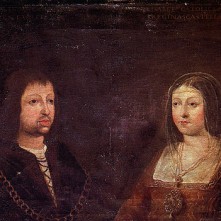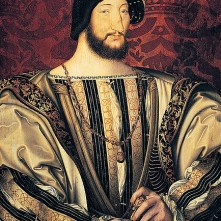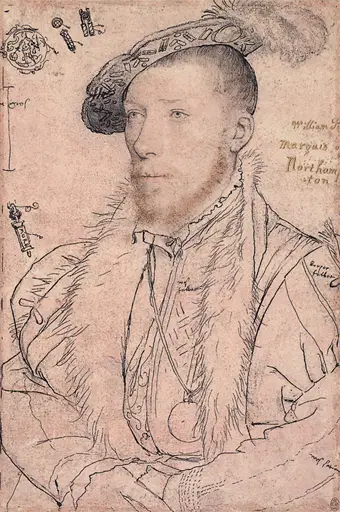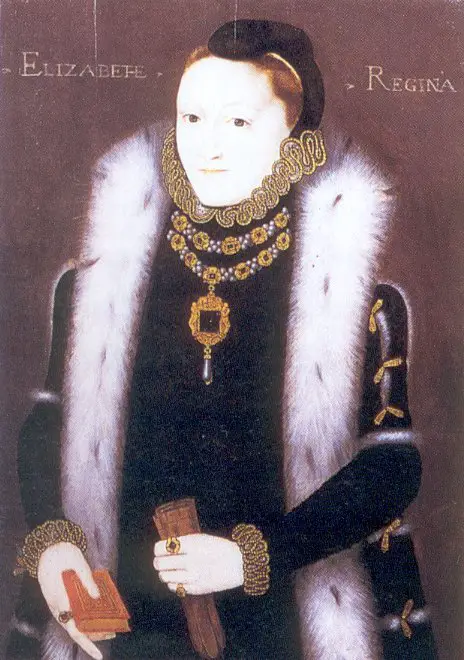15 October
1536 – Henry VIII wrote to the Earl of Shrewsbury, the Duke of Suffolk “and others” with instructions on handling the rebellion which we now know as the Pilgrimage of Grace. The King also wrote to the rebels in Lincolnshire promising “to show them mercy if they leave all their harness and weapons in the market-place of Lincoln”.
1537 - Christening of Henry VIII’s son, the future Edward VI, in the Chapel Royal at Hampton Court. Edward’s half-sister Mary stood as godmother, while his other half-sister, the four year-old Elizabeth, bore the chrisom cloth, helped by Edward’s uncle, Edward Seymour. Thomas Howard, the Duke of Norfolk, Charles Brandon, the Duke of Suffolk, and Archbishop Cranmer stood as godfathers. Click here for more.
1542 – Death of William Fitzwilliam, Earl of Southampton, courtier, diplomat and naval commander, in Newcastle-upon-Tyne. It is thought that he was buried in Newcastle. Southampton's offices included Vice Admiral, Treasurer of the Household and Lord Privy Seal. He died while leading troops to Scotland under the command of Thomas Howard, 3rd Duke of Norfolk.
1582 – The first day of the Gregorian calendar following the last day of the Julian calendar, 4th October 1582, meaning that the 5th-14th October did not exist in the year 1582. Many countries ignored Pope Gregory XIII’s papal bull and carried on using the Julian Calendar. England, for example, did not introduce the Gregorian calendar until 1752.
1584 – Execution of Richard Gwyn (White), martyr, schoolteacher and Welsh language poet, at Wrexham in Wales. He was hanged, drawn and quartered for high treason because of his Catholic faith.
1590 – Death of William Bleddyn (Blethin), Bishop of Llandaff. He was buried in Matharn Church, in the chancel.
1595 – Death of Philip Howard, 13th Earl of Arundel, in the Tower of London. It was rumoured that his cook had poisoned him. Arundel had been imprisoned for high treason, because of his Catholic faith and for fleeing England without Elizabeth I's permission. He was buried in the Tower chapel, St Peter ad Vincula.
16 October
1532 - While Anne Boleyn and Henry VIII were lodged in Calais, the Duke of Norfolk, Earl of Derby and a group of gentleman met with “the great mayster of Fraunce” Anne, duc de Montmorency, and his men at the English Pale, six miles outside of Calais. This meeting was to plan where Henry VIII would meet Francis I.
1555 - The burnings of two of the Oxford martyrs: Hugh Latimer, Bishop of Worcester, and Nicholas Ridley, Bishop of London. Click here to read more.
1573 – Death of Thomas Davies, Bishop of St Asaph, at Abergele in Denbighshire.
1594 – Death of Cardinal William Allen at his home in the via Monserrato, Rome, while in exile. He was buried in Rome, in the English College's Church.
17 October
1560 – Baptism of Walter Marsh, spy and Protestant martyr, at St Stephen's Church, Coleman Street, London. Marsh was burned to death in Rome’s Campo dei Fiori after having his tongue and hands cut off. He had been accused of being paid by Elizabeth I to spy on Catholics and showing contempt for the Eucharist.
1586 - The poet, courtier and soldier Sir Philip Sidney died as a result of an injury inflicted by the Spanish forces at the Battle of Zutphen in the Netherlands. His body was returned to England and laid to rest on the 16th February 1587 in St Paul’s Cathedral. Click here to read more.
1592 – Death of Frances Brooke, Lady Cobham, wife of William Brooke, 10th Baron Cobham. She was buried at Cobham. Lady Cobham is known for being featured in the famous Elizabethan family portrait, The Cobham Family (1567). She served Elizabeth I as Mistress of the Robes and Lady of the Bedchamber.
1595 – Death of Sir Thomas Heneage, courtier and politician, at the Savoy. He was buried at St Paul's Cathedral, in the Lady Chapel. Heneage served Elizabeth I as a member of Parliament, gentleman of the Privy Chamber, Vice-Chamberlain of the Household, Privy Councillor and Chancellor of the Duchy of Lancaster.
18 October
1529 – Cardinal Thomas Wolsey surrendered the Great Seal following the writ of praemunire being filed against him on the 9th October.
1536 – Birth of William Lambarde, antiquary and lawyer, in London. Lambarde is known for his “Perambulation of Kent” (1570) and “Eirenarcha: or of the Office of the Justices of Peace” (1581).
1538 – Baptism of Francis Kinwelmersh (Kindlemarsh), poet, at All Hallows Church, Bread Street, London. Kinwelmersh is known for his collaboration with George Gascoigne on “Jocasta” (1566) and his contributions to “The Paradyse of Dainty Devises” (1576).
1541 - Margaret Tudor, sister of Henry VIII and former Queen of Scotland, died of a stroke at Methven Castle, Perthshire, Scotland. She was laid to rest at the Carthusian Priory of St John in Perth, which was later destroyed. Click here to read more.
1555 – Elizabeth Tudor, the future Elizabeth I, was finally given permission to leave court and travel to her own estate at Hatfield, rather than return to house arrest at Woodstock. Click here to read more.
19 October
1469 - Marriage of Ferdinand of Aragon and Isabella of Castile, the famous 'Reyes Católicos' and the parents of Catherine of Aragon, in the Palacio de los Vivero, Valladolid, Spain. Isabella became Queen Isabella I of Castile in 1474 and Ferdinand became King Ferdinand II of Aragon in 1479, so their marriage united the powerful kingdoms of Aragon and Castile, a vast territory which comprised most of what is modern-day Spain.
1512 – Reformer Martin Luther was awarded his Doctorate of Theology from the University of Wittenberg.
1536 - Henry VIII got tough on the Pilgrimage of Grace rebels. In a letter to Charles Brandon, Duke of Suffolk, Henry wrote "[...] if it appear to you by due proof that the rebels have since their retires from Lincoln attempted any new rebellion, you shall, with your forces run upon them and with all extremity ‘destroy, burn, and kill man, woman, and child the terrible example of all others, and specially the town of Louth because to this rebellion took his beginning in the same." And in an letter to the Earl of Derby, he wrote: "[...] but having since heard of an insurrection attempted about the abbey of Salley in Lancashire, where the abbot and monks have been restored by the traitors, we now desire you immediately to repress it, to apprehend the captains and either have them immediately executed as traitors or sent up to us [...] You are to take the said abbot and monks forth with violence and have them hanged without delay in their monks’ apparel, and see that no town or village begin to assemble."
1592 – Death of Anthony Browne, 1st Viscount Montagu, courtier and member of Parliament, at his manor of West Horsley, Surrey, He was buried at Midhurst. Montagu served Mary I as an ambassador and Privy Councillor, and Elizabeth I as Lord Lieutenant of Sussex.
20 October
1536 - Lord Darcy surrendered Pontefract Castle to the rebels of the Pilgrimage of Grace.
1549 – Death of John Uvedale, administrator. Uvedale served Henry VIII as Secretary to the Duke of Richmond's Council in the North, Secretary to Queen Anne Boleyn (1533-1536), Commissioner in the Dissolution of the Monasteries and Paymaster to the forces in the East and Middle Marches. In Edward VI's reign, he was Under-Treasurer for the Scottish war.
1557 (20th or 21st) – Death of Mary Arundell, (other names Mary Radcliffe, Countess of Sussex and Mary Fitzalan, Countess of Arundel), at Bath Place, London. She was originally buried at St Clement Danes' Church, but now rests in the Fitzalan Chapel at Arundel Castle. Mary was the daughter of Sir John Arundell of Lanherne in Cornwall and was married twice, first to Robert Radcliffe, Earl of Sussex, and second to Henry Fitzalan, Earl of Arundel.
1573 – Death of Thomas Smith, colonial adventurer, at Comber in the Ards, co. Down, Ireland, after being shot by one of his Irish employees. Smith had been attempting to colonise that part of Ireland and had become unpopular with the locals.
1581 – Death of James Blount, 6th Baron Mountjoy, at Hooke in Dorset. Blount was made a Knight of the Bath at Mary I's coronation, served as a Justice of the Peace, and experimented with alchemy.
21 October
1449 – Birth of George, Duke of Clarence, son of Richard, Duke of York, and brother of Edward IV and Richard III, at Dublin. He was born in Ireland because his father was serving there as Lord Lieutenant of Ireland. Clarence was also the father of Margaret Pole, Countess of Salisbury.
1532 – Henry VIII left Anne Boleyn in Calais to spend four days with Francis I, “his beloved brother”, at the French court in Bolougne. He returned with Francis on the 25th October.
1536 - Lancaster Herald, on nearing Pontefract Castle, encountered a group of armed peasants. The peasants explained that they were armed “to prevent the ‘comontte’ and Church being destroyed; for, they said no man should bury, christen, wed, or have beasts unmarked without paying a tax and forfeiting the beast unmarked to the King’s use.” Rebel leader Robert Aske then met with Lancaster Herald at Pontefract Castle. Aske refused to let the Herald read out the proclamation which told of how the Lincolnshire rebels had submitted, and declared that he and his people were intent on staying true to their cause and would be marching on London. Lancaster Herald reiterated that he was required to read his proclamation to the people but Aske would not let him and instead offered him safe conduct out of the castle and town.
1542 – “The 21st day of October in the xxxiiij year of the reign of our Sovereign lord King Henry the viijth., the duke of Norfolk’s grace, lieutenant to the King’s Highness, removed and camped in the borders of Barwicke”. Records show that Norfolk and his men went on to burn and pillage a number of towns in the Scottish borderlands.
1554 – Death of John Dudley, 2nd Earl of Warwick and son of John Dudley, Duke of Northumberland, at Penshurst, the house of his brother-in-law Henry Sidney, in Kent. Dudley and his brothers, Robert and Henry, had just been released from the Tower of London after the fall of their father, brother Guildford and sister-in-law, Lady Jane Grey.










Leave a Reply